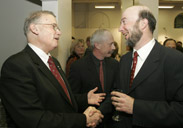Vinet crosses the mountain

Former McGill principal Bernard Shapiro and departing provost Luc Vinet at Vinet's goodbye party, March 22
Owen Egan
After six years as provost and vice-principal (academic) at McGill University, Luc Vinet returns to the Université de Montréal not to resume teaching theoretical physics, but to take the helm as rector of Quebec's largest university. Although his position officially begins June 1, 2005, Vinet has already handed over his dossiers to acting Vice-Principal and Provost Anthony Masi, and has begun the work required in such a major transition.
"I'm a man without a portfolio," he mused over the phone earlier this week from his former office. "I'm supporting my friend Tony and educating myself as the future rector of the Université de Montréal. It's a very short transition and I'll have two months to get acquainted with the position."
Vinet returns to his alma mater at a time when the question of the location of the Centre hospitalier de l'Université de Montréal has still not been finalized, and when thousands of students are fighting to maintain the current levels of tuition and government bursaries. In Le Devoir and La Presse last Monday, in which his photo appeared on the front page, he mentioned his hopes that the university would use the Outremont train yards for a new campus even if the eventual superhospital goes to the favoured St. Denis and René Lévesque Streets location.
"The university has nowhere left to build on the mountain. We have to look elsewhere," he told La Presse.
Vinet, like outgoing rector Robert Lacroix, also mentioned that he supports increased tuition, though not at the cost of excluding low-income students.For the moment, however, his biggest task is selecting his entourage of senior administrators. Unlike the McGill system where the duration of term of the vice-principals isn't determined by the comings and goings of rectors, at the Université de Montréal, the VPs come and go with the rector.
The rector makes his choices then has the slate approved by the Assemblée universitaire, the equivalent of McGill's senate, Vinet explained. "I've got to get myself into the task right now."
While the announcement of Vinet's new position came as no surprise to the outgoing McGill provost, or to Principal Heather Munroe-Blum, it was not a position for which Vinet actively campaigned. Last summer, when Vinet was nominated as one of the candidates for the position, he agreed to leave his name in the running but not to participate in any of the public debates.
"The principal was in the know and was very supportive of me," said Vinet, who accepted the position without hesitation. "It's a privilege to be given such responsibility."
At the same time, Vinet is sad to be leaving McGill. "I felt at home here right from the beginning. I feel so enriched for having been a member of McGill," he said, adding that this is where he "did his classes" in the art of university administration. "I'd just been a week in the job when [former principal] Bernard Shapiro left on vacation. There I was, as acting principal, having to produce the strategic document demanded by the government's performance contract. I was forced to learn about McGill very quickly."
Vinet thinks his McGill training will put him in good standing at the Université de Montréal, a university that is similar to McGill in being old, research-oriented and having all the major faculties. But the French-language institution is bigger, with 40,000 students, and it has one of the largest medical schools on the continent. He is impressed by McGill's connection to North America and its decentralized style of management. "I will look at moving toward decentralizing at the Université de Montréal, and giving more responsibility to the deans," he said.
Of all his accomplishments, Vinet thinks the one that will have the greatest lasting impact is his progam of academic renewal. "We were on our way to hiring 1,000 academics over a decade and I took it more than halfway through," he said.
His only regret is to not have been able to finish the hiring of the six new deans and to not have taught any McGill students. "Maybe I'll get to come back as an invited lecturer," he says, a little wistfully.
